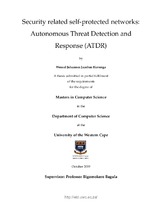| dc.contributor.advisor | Bagula, Bigomokero | |
| dc.contributor.author | Havenga, Wessel Johannes Jacobus | |
| dc.date.accessioned | 2022-03-02T12:29:40Z | |
| dc.date.available | 2022-03-02T12:29:40Z | |
| dc.date.issued | 2021 | |
| dc.identifier.uri | http://hdl.handle.net/11394/8778 | |
| dc.description | >Magister Scientiae - MSc | en_US |
| dc.description.abstract | Cybersecurity defense tools, techniques and methodologies are constantly faced with increasing
challenges including the evolution of highly intelligent and powerful new-generation threats. The
main challenges posed by these modern digital multi-vector attacks is their ability to adapt with
machine learning. Research shows that many existing defense systems fail to provide adequate
protection against these latest threats. Hence, there is an ever-growing need for self-learning technologies
that can autonomously adjust according to the behaviour and patterns of the offensive
actors and systems. The accuracy and effectiveness of existing methods are dependent on decision
making and manual input by human experts. This dependence causes 1) administration
overhead, 2) variable and potentially limited accuracy and 3) delayed response time. | en_US |
| dc.language.iso | en | en_US |
| dc.publisher | University of Western Cape | en_US |
| dc.subject | Denial of service attacks | en_US |
| dc.subject | Machine learning | en_US |
| dc.subject | Neural networking | en_US |
| dc.subject | Self-protected networks | en_US |
| dc.subject | Anomaly detection | en_US |
| dc.subject | Cybersecurity | en_US |
| dc.title | Security related self-protected networks: Autonomous threat detection and response (ATDR) | en_US |
| dc.rights.holder | University of Western Cape | en_US |

